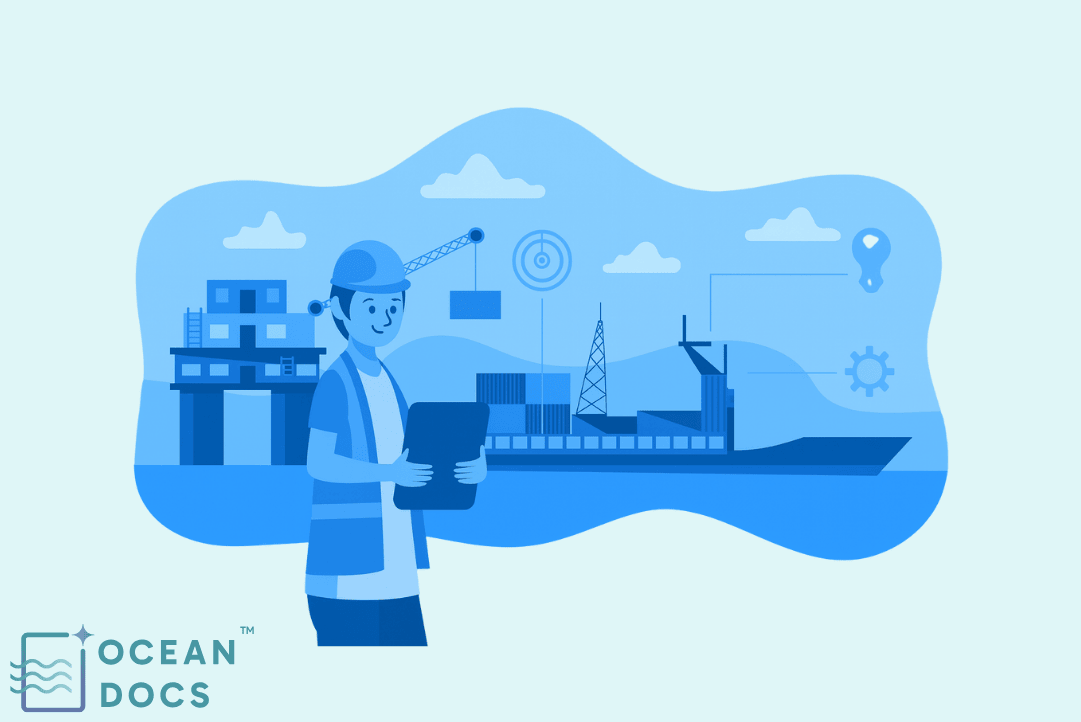
Making Maritime Compliance Simple with Smart Documentation
October 17, 2025 By OceanDocs AI
Maritime operations depend on accuracy, safety, and trust. Every voyage, inspection, and audit relies on having the right shipping documents ready at the right time. Yet, with hundreds of regulations, safety codes, and inspection protocols, managing maritime compliance can feel like a full-time job.
The good news is that technology now makes compliance easier, faster, and more reliable. By using document intelligence and automated document processing, shipping companies can simplify complex documentation tasks and ensure audit readiness at all times.
Why Maritime Compliance Is So Complex
Every vessel must maintain and update dozens of mandatory ship documents that demonstrate safety, environmental responsibility, and crew training. These include Maritime documentation like the Safety Management System, Fire Control Plan, COLREGs, ISM Code, and STCW certificates.
On top of that, ships must meet global maritime regulations such as MARPOL, SOLAS, ISPS Code, Ballast Water Management, and IMO regulations. Each rule focuses on a different aspect of vessel operation — pollution prevention, fire safety, cargo handling, or crew training. Missing or outdated paperwork during Port State Control inspections can result in detentions, fines, or reputational damage.
Traditional methods, such as paper-based filing or scattered spreadsheets, make it difficult to keep up with these evolving standards. Digitalization in the maritime industry is solving this problem by centralizing, classifying, and tracking documents automatically.
How Smart Documentation Simplifies Compliance
Smart shipping depends on organized, accessible, and verifiable data. Using a document management system powered by AI in shipping can help companies store, categorize, and verify compliance records in real time.
Here’s how modern tools are changing compliance management:
-
Automated Document Processing
Advanced systems automatically read and classify shipping documentation, from certificates and logbooks to audit reports. They use optical character recognition and AI models to identify key details such as expiry dates, vessel names, and safety categories. This reduces manual entry and human error. -
Centralized Access and Smart Tagging
A digital document management system software creates one source of truth. Teams can access the same verified compliance documentation, whether they are on the vessel or at shore offices. Smart tagging makes it easy to locate Safety Management System manuals or Port Operations records instantly. -
Audit and Inspection Readiness
Tools with built-in document intelligence alert operators before certificates expire. They can also organize files based on specific inspections like SIRE Vetting, SIRE 2.0, or Port State Control. This ensures continuous inspection readiness and reduces last-minute document hunts. -
AI for Regulatory Compliance
AI-powered maritime software solutions interpret MARPOL regulations, SOLAS definition, and other international rules to verify if the vessel’s documentation meets required standards. This helps ship operators stay compliant even when geopolitical risks or regulation updates occur. -
Risk Assessment and Predictive Insights
Integrated Marine Technology systems use risk analysis to identify potential compliance gaps. For example, missing Pollution Prevention records or outdated Electronic Logbooks can be flagged early for review. Predictive analytics can even suggest preventive actions for improved vessel safety.
How It Benefits Ship and Fleet Management
Modern ship management software goes beyond storing files. It connects documentation with operational data such as maintenance logs, crew management, and fleet management schedules.
-
Fleet Management Solutions allow centralized monitoring of certificates across multiple vessels.
-
Ship Crew Management ensures that every crew member’s training records, such as STCW and HSEQ, are updated and verified before deployment.
-
Technical Ship Management systems ensure that equipment inspections and safety manuals are properly documented, supporting smooth Sire Vetting and audit processes.
By integrating all these workflows, companies can run safer, more compliant, and more transparent operations.
Reducing Errors and Enhancing Safety
Many compliance issues stem from lost, expired, or inconsistent documents. A document management system reduces these risks by maintaining accurate, timestamped records.
Features like smart documentation and AI-driven tracking allow operators to align with frameworks such as the ISGOTT, IMDG Code, LSA Code, and ISM compliance requirements. When combined with digitalization in maritime industry, these systems improve crew safety, streamline Marine operations, and reduce downtime caused by administrative delays.
Digital platforms also support Maritime Security by ensuring that sensitive documents are accessible only to authorized personnel. For Ship Management Companies, this balance between accessibility and control is key to ensuring regulatory adherence across global fleets.
From Compliance to Confidence
The goal of compliance is not only to pass inspections but to create a culture of safety and accountability. By embracing AI document intelligence and automated systems, ship operators can move beyond reactive compliance and build proactive processes that enhance both safety and performance.
With integrated systems managing port logistics, navigation safety, and marine surveying, companies can make informed decisions faster. As Digitalization in the maritime industry continues, smart tools will play a vital role in transforming fleet ship management and ensuring long-term sustainability.
Conclusion
Compliance does not have to be complicated. With intelligent document management system software, automated document processing, and connected Marine Technology, shipping companies can achieve real-time visibility and accuracy in every operation.
From Port State Control to Sire Vetting, these tools simplify inspections, improve audit readiness, and strengthen Maritime compliance. By investing in smart documentation, the industry is moving toward a safer, cleaner, and more transparent maritime future.